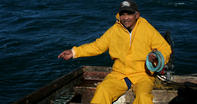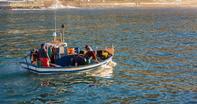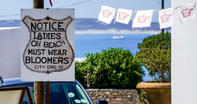Woman - A Bad Omen
A woman aboard a ship is bad luck, maritime lore holds. Her presence will enrage the sea and it will bring on a disastrous storm. This olde worlde universal superstition amongst seafarers has even seeped into the West Coast fishing tradition where it still prevails.

Some fishermen are genuinely afraid of having a woman aboard their bakkies. Turning women into “fishermen”, by giving them quotas, inflamed this old belief. Many of the villages that have sprung up on the coast alongside the Benguela Current were the result of spill over from the potato farms of the Sandveld and Swartland wheat fields.
Labourers would work the farms most of the year, but take to the ocean seasonally. A boom in the rock lobster market the 1940s and 1950s saw white-owned enterprises popping up along the West Coast – in like Paternoster, Elandsbaai, Lambert’s Bay – permanently drawing many farm labourers into the fishing industry.
Male Dominated Industry
But it was always a male-dominated world, where cultural norms prescribed the woman’s role, cementing patriarchy within the home which then aligned with the mythical notions about the danger of having women at sea.
So, women worked the factory production lines, cleaning and packaging lobster tails, while the men did the more manly stuff, the serious and more demanding work of handling the boats, going out to sea, bringing in the catch. Generations later, and the gender strata are engrained within a community. So it did not sit well with many fishermen when the re-allocation of fishing quotas took some of those permits away from men and handed them over to women.
Jackie Sunde, who has worked extensively with these fishing communities over the years, says there has been a revival of these notions about women at sea since Marine and Coastal Management decided to include them in the deal, giving them access to a percentage of the annual catch.
“Women were actively sought out to get quotas,” she explains from the Masifundise Development Trust offices in Observatory, Cape Town, “and as a result, many men lost their quotas through the transformation process. So in some of these communities, the men see women as having taken their quotas, take their jobs. It’s causing a lot of tension within some households.”
It’s a Man’s World

The sea has long been a man’s world, although, ironically, it is talked about it as if it were a woman. The same capricious moods, the fishers say, the same “cleansing” processes, the need for respect and appeasement. The sea, she is a fickle and demanding thing. At first, when women were included in the quota system, they did not need to go out to sea.
Their husbands or brothers could fish on their behalf. But this changed in 2006, where the law now states that the quota holder must be present in the boat when the catch is taken. Small groups of women now go to sea, usually as a passenger in husband’s boat. Some of them are absolutely petrified, and will sit, unmoving, in a corner of the boat while the fishing happens.
Others might help with the baiting. But the actual casting of the line and catching of the fish remains overwhelmingly in the hands of the men. Some of these women, though, have started referring to themselves as “fishermen”, an interesting though unintentional comment on their sense of identity.
Change but Respect Traditions

Overturning the status quo is potentially contentious – should one respect cultural and traditional norms, or should one try to bring about more “modern” gender equity? Jackie believes women should definitely be allowed access to fishing quotas, and that women’s position within the community should be elevated, but that this needs to be done sensitively and through interactions with the community.
“Male dominance in some of these communities is strongly tied to the high level of domestic violence and abuse, particularly along with Cape South Coast where poaching and drugging are associated with very high levels of violence.” “You have to tackle the patriarchy, but be respectful of traditions. Then you can help women take on the negative aspects of that patriarchy.”
Transformation at Work

One story emerges from a fishing village just south of Lambert’s Bay. It is the story of a woman, a domestic worker for most of her adult life, who was awarded a rock lobster quota and it transformed her life forever. Before this happened, though, she was locked into a life where her only employment options were domestic work or taking a job down at the fish factory.
She would arrive at work with her hands blistered by some unnamed outpouring of violence in her home. Something involving an iron. She denied it, but it was not accidental. Then she and a group of ladies were awarded a lobster quota. They bought their own boat. Her fortunes reversed.
Now, 15 years later, she is free of the relationship that blighted her emotional landscape and scarred her physical body. She lives in her own small hob house with her children, and owns a washing machine. She is getting her drivers licence, volunteers as a police reservist and sometimes, just sometimes, even wears trousers. It’s astonishing how powerful someone can become, when they’re given an option. And financial emancipation gave this woman exactly that.
By Leonie Joubert